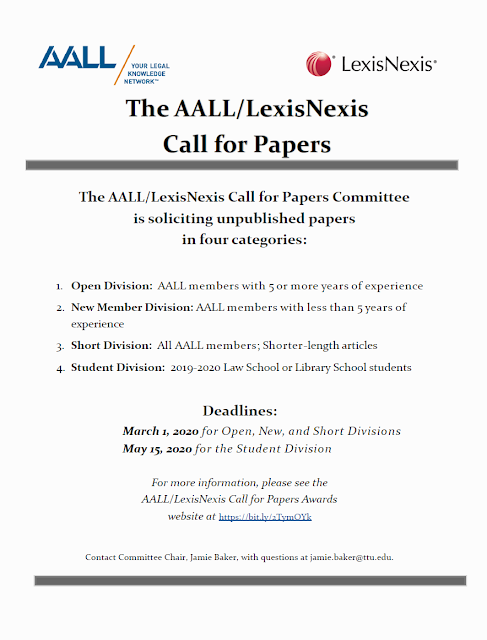AALL Releases The Economic Value of Law Libraries
In October 2013 the American Association of Law Libraries issued a Request for Proposal seeking consultants to deliver a report on the economic value of law libraries.
The time has come for the release of the final report on the Economic Value of Law Libraries by the Economic Value of Law Libraries Special Committee.
Dewey B. Strategic has a breakdown of the highlights of the report:
Qualitative Information
1. Employ both formal and informal communications regularly.
2. Provide context with qualitative data.
3. Use testimonials to highlight the impact of delivered services.
4. Tailor the value message to stakeholder preferences.
Quantitative Information and Analysis
1. Go beyond the mere measurement of activities and utilize methods that measure and demonstrate success or impact on organizational services.
2. When reporting metrics related to specific library activities, report them in the context of the larger frame of importance to the organization.
3. Define the measurements within your organization used to demonstrate value to their stakeholders (clients, elected officials, board of trustees) and adjust library metrics accordingly.
4. Identify the external resources used by stakeholders to evaluate organizational success and especially law library success. Adapt internal processes as appropriate.
5. Identify current formal valuation methodologies used within your organization. Evaluate the applicability of that method for use by the law library and adjust the related processes accordingly.
Communication
1. Determine your stakeholder’s information delivery preferences, including distribution channels through a collaborative process with the stakeholder.
2. Create a schedule of reporting that fits into the strategic planning and decision making cycle of the organization to ensure that critical library data is delivered in a relevant timeframe.
3. Refrain from using library jargon when sharing qualitative data.
4. Find or make opportunities to present the information in formal meeting settings.
5. Determine the communication styles that match organizational preferences and get comfortable with different communication styles that can be easily adjusted to formal and informal settings as well as stakeholder preferences.
Comprehensive Best Practices
1. Form strong interpersonal relationships with stakeholders.
2. Employ short, frequent communication through existing channels as defined by stakeholder preferences.
3. Create templates that highlight the key considerations for current strategic initiatives in both narrative and numerical formats.
4. Adjust information delivery to meet a mix of demands and expectations.
5. Define foundational library services and emerging service opportunities within your organizations through a collaborative strategic process with stakeholders.
6. Embrace the leadership responsibilities and expectations of the management and director role.
Although the report is helpful, it doesn't offer the kind of concrete evidence of the economic value of law libraries that most of us were expecting. As Dewey B. Strategic mentions, this is basically "a collection of rubrics and best practices for a 'do-it-yourself' project."
The time has come for the release of the final report on the Economic Value of Law Libraries by the Economic Value of Law Libraries Special Committee.
Dewey B. Strategic has a breakdown of the highlights of the report:
Qualitative Information
1. Employ both formal and informal communications regularly.
2. Provide context with qualitative data.
3. Use testimonials to highlight the impact of delivered services.
4. Tailor the value message to stakeholder preferences.
Quantitative Information and Analysis
1. Go beyond the mere measurement of activities and utilize methods that measure and demonstrate success or impact on organizational services.
2. When reporting metrics related to specific library activities, report them in the context of the larger frame of importance to the organization.
3. Define the measurements within your organization used to demonstrate value to their stakeholders (clients, elected officials, board of trustees) and adjust library metrics accordingly.
4. Identify the external resources used by stakeholders to evaluate organizational success and especially law library success. Adapt internal processes as appropriate.
5. Identify current formal valuation methodologies used within your organization. Evaluate the applicability of that method for use by the law library and adjust the related processes accordingly.
Communication
1. Determine your stakeholder’s information delivery preferences, including distribution channels through a collaborative process with the stakeholder.
2. Create a schedule of reporting that fits into the strategic planning and decision making cycle of the organization to ensure that critical library data is delivered in a relevant timeframe.
3. Refrain from using library jargon when sharing qualitative data.
4. Find or make opportunities to present the information in formal meeting settings.
5. Determine the communication styles that match organizational preferences and get comfortable with different communication styles that can be easily adjusted to formal and informal settings as well as stakeholder preferences.
Comprehensive Best Practices
1. Form strong interpersonal relationships with stakeholders.
2. Employ short, frequent communication through existing channels as defined by stakeholder preferences.
3. Create templates that highlight the key considerations for current strategic initiatives in both narrative and numerical formats.
4. Adjust information delivery to meet a mix of demands and expectations.
5. Define foundational library services and emerging service opportunities within your organizations through a collaborative strategic process with stakeholders.
6. Embrace the leadership responsibilities and expectations of the management and director role.
Although the report is helpful, it doesn't offer the kind of concrete evidence of the economic value of law libraries that most of us were expecting. As Dewey B. Strategic mentions, this is basically "a collection of rubrics and best practices for a 'do-it-yourself' project."


Comments
Post a Comment